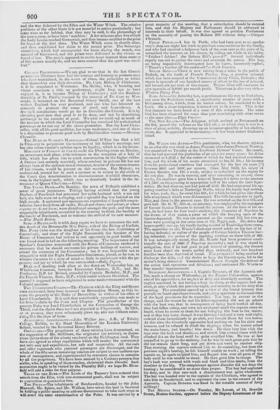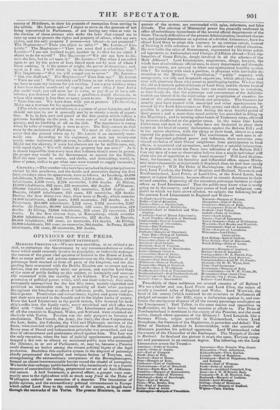Mit. WARD:: THE Acron.—This gentleman, who, we observe, rejoices in
an alias (he was cited as James Prescott alias James Prescott Warde), was examined on Tuesday at the Insolvent Debtors' Court. He stated, that he had pursued the profession of an actor for many years: his debts amounted to 1,2021. ; for the entire of which lie had received considera- tion, and the whole of his assets amounted to but 5/. 10s.; his income from his professional exertions had averaged for the last six years [1 between 4001. and 500/. per annum. Since May 1829, his salary at Covent Garden was 161. a week, subject to deduction on the nights he did not play. He was in custody, and after remaining in custody three weeks, his creditors gave him a letter of licence for debts to the amount of 1,7501. on his agreeing to appropriate half of his salary for their liqui- dation. He had done so, and had paid tiff 450/. He had contracted his op- posing creditor's debt at Tunbridge Wells, where his family had resided, for wine, coals, &c. ; he owed him 801., for which lie bad given him three bills of exchange which were dishonoured. The bills became due in April, May, and June in the present year. Ile was arrested on the first bill, and gave bail. Ir. G. 'IV. Abbott, an attorney, was employed by the managers of Covent Garden Theatre to defend the actions. At the time of his ar- rest, he had been for four weeks studying the character of Napoleon in the drama of that name, a piece on which the keeping open of the theatre depended. Ile was not arrested on the second bill, but two ac- tions were pending at the same time at Mr. Pegg's suit. His debts had imperceptibly run up, his family having resided at Tunbridge three years. The opposition to Mr. Warde's discharge rested solely on the fact of hi having defended, or rather of the people of Covent Garden Theatre hav- ing defended, the action of the opposing creditor on these bills of 80/. It was subsequently stated, that Mr. W arde had been promised condi- tionally the sum of 2001. if Napoleon succeeded ; and it was stated in mitigation, that if he had gone to jail instead of pleading, the theatre must have closed six weeks earlier than ordinary, and two hundred families been thus deprived of bread. The prospect of being enabled to discharge the debt, aid the desire to keep the theatre open, led to the action's being defended. Commissioner Bowen thought the defence of the action both vexatious and frivolous ; and sentenced Mr. Warde to four months' imprisonment.
111Encnastr APPRENTICES.—A Captain Brunton, of the Agenoria col- lier, made a charge on 'Wednesday, at the Thames Police-office, against one of his apprentices, for neglect of duty and disorderly conduct. The neglect consisted in not having a boat on shore, as the captain had de- sired, at nine o'clock the previous night, and refusing to do his duty that
morning. The complaint opened up a view of the brutal tyranny that prevails on board merchant-vessels, and ;aVe a specimen at the same time of the legal provisions for its repression. The boy, in answer to the charge, said the reason he and his fellow-apprentice did not go ashore with the boat was, that in consequence of being hard-worked all day, they had fallen asleep, and were not awakened until the captain came on board, when he swore at them for not bringing the boat to the stairs ; and at that late hour, though it was blowing hard and a very cold night,
ordered them immediately-to go aloft, and remain there for two hours.
At this time the disorderly apprentice had nothing on but his shirt and trousers, and he refused to climb the rigging ; when his master seized the main-brace, and knocked him down. Ile then beat him with the rope over the back and shoulders, and struck him several times with his clinched fist on the head until he quite stupified him. He was at last compelled to go up to the maintop, but he was in such great pain that he did not remain there long, and got down and went to another ship. That morning the captain ordered him to do something, but from the previous night's beating, he felt himself unable to work ; on telling the captain so, he again stripped him, and flogged him over all parts of the body until he was unable to stand. He then gave him in charge. The boy's back was covered with weals and black and blue marks, from the shoulder to the hip. The complainant against disorder did not deny the beating ; he considered it no more than proper. The boy had neglected his duty, and in that case such a chastisement was quite wholesome. The boy was handed over to the captain of the Chieftain, who agreed to take him to Sunderland, and to represent the case to the owners of the Agenoria. Captain Brunton was fined in the notable amount of forty shillings !
county of Middlesex, to show his grounds of exemption from serving in the militia. Mr. Lovett said—" I object to serve on the grounds of not being represented in Parliament, of not having any voice or vote in the election of those persons who make the laws that compel me to take up arms to protect the rights and property of others, when my own rights, and the only property I possess—my labour—is not protected." The Magistrate—" Then you object to serve ?" Mr. Lovett—" Cer- tainly." The Magistrate—" Then you must find a substitute." Mr. Lovett—" I am not inclined to get another to do that for me which I object to do for myself." The Magistrate—" We are not here to dis- cuss the law, but to act upon it." Mr. Lovett—" But when I am called upon to act by the power of laws forced upon rue by men of whom I know nothing, it is the power of might, the power of despotism ; and, -weak as I am, I will resist it, be the consequences what they may." The Magistrate—" But we will compel you to serve." Mr. Lovett- " But you shall not." The Magistrate—" Turn him out." Mr.Lovett -" Turn me out ! Why certainly you'll listen to me when yon summon me here to state my reasons for not serving. I am a poor working man; I have bren twelve months out of employ; and now when I have had a few weeks' work, you call upon me to serve, or pay 31. or 4/. for a sub- stitute; you demand no more from a gentleman worth thousands, to whom that money is less than so many pence to me. The magistrate- " Turn him out. We have done with you at present. (7's the clerk.) Malse out a warrant for his apprehension."
[The whole system of substitutes is a system of gross injustice, and we should not care to see it generally met by so sturdy a mode of opposi- tion. It is, in fact, part and parcel of the fine system which inflicts a grievous hardship on the poor, in every case of real or fancied delin- quency, and no hardship at all on the rich. The magistrate is wrong when Ire talks of compelling a man to serve. The King cannot do that even by the assistance of Parliament. We must at the same time ob- serve that the ground taken up by Mr. Lovett is an extremely unte- nable one. According to his argument, no man not twenty-one could, under universal suffrage even, be called on to defend his country. Might not the electors, if noire but electors are to be militia-men, say, with equal right, " We will defend no property but our own ?" As it is almost impossible that every man that is drawn should serve in person, the proper way would be for Government to recruit for the Militia. Half the sum spent in courts, and clerks, and lists-taking, would, in time of peace, suffice to get what men were wanted to supply vacancies.]



























 Previous page
Previous page